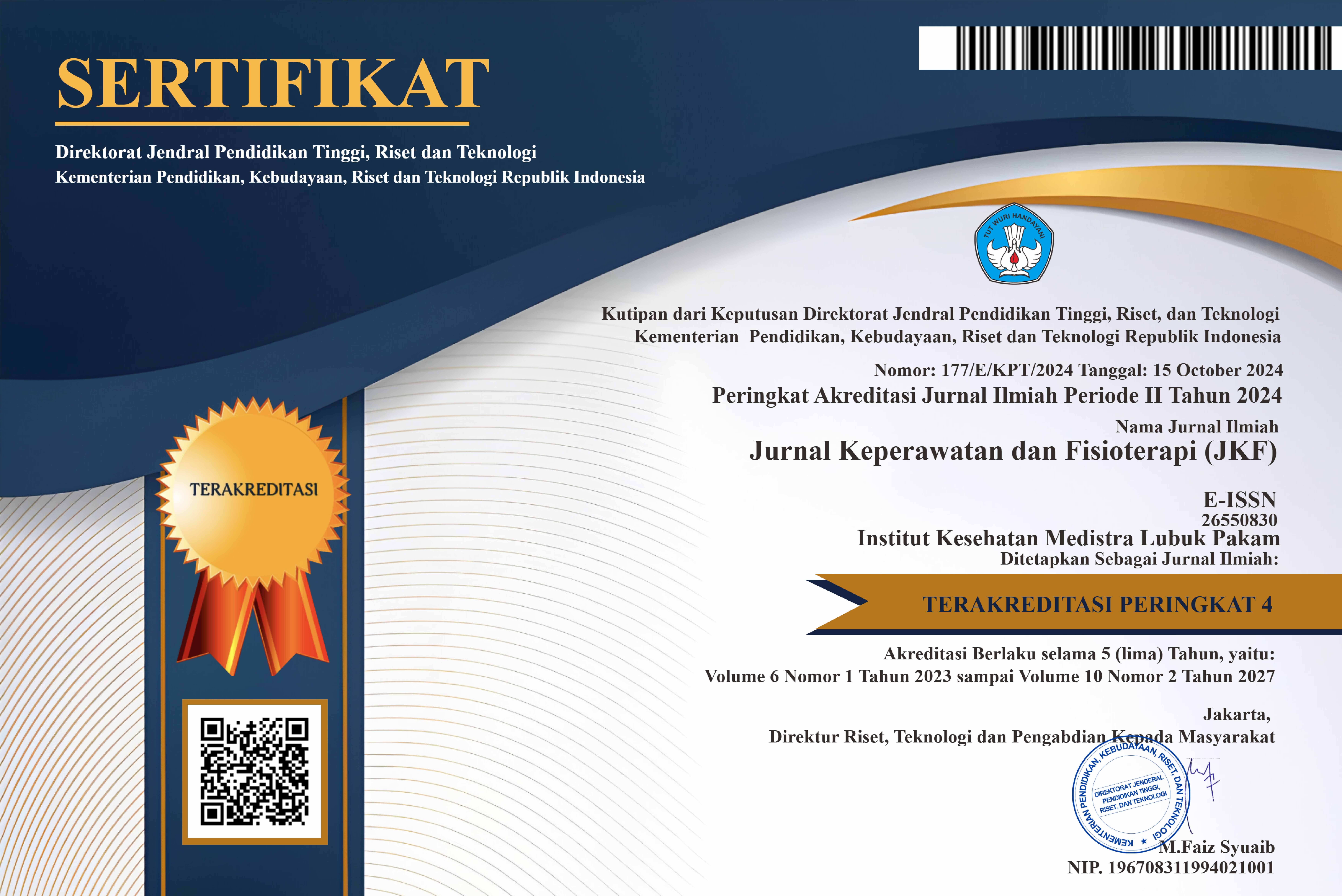The Correlation Of Smartphone Addiction And Interpersonal Communication Ability Of Undergraduate Nursing Students
DOI:
https://doi.org/10.35451/jkf.v6i2.2119Abstract
The existence of smartphones has brought both positive and negative impacts on human life. Unwise use of smartphones can lead to addiction, which affects communication. Establishing good relationships to prevent social alienation in interpersonal communication is important. This study aims to determine the relationship between smartphone addiction and the interpersonal communication skills of undergraduate nursing students and to determine the level of addiction and interpersonal communication skills at each level. The method used is correlational with a cross-sectional approach. The population consists of 464 undergraduate nursing students at the UPI Sumedang Campus with a sample of 215 students, using a stratified random sampling technique. This study uses a questionnaire instrument. Correlation data analysis uses Spearman's rank. The results of the study are that both variables are in the moderate category at each semester level, and the results of the correlation test with a p-value <0.001 (<0.005) have a significant relationship with a correlation coefficient of r -0.224, meaning the strength of the relationship is weak. The negative correlation value means that the higher the smartphone addiction, the lower the interpersonal communication skills. The conclusion of this study is that there is a relationship between smartphone addiction and the interpersonal communication skills of undergraduate nursing students. The level of addiction and interpersonal communication skills of all respondents were in the moderate category. It is recommended for students to use smartphones moderately and more wisely to avoid negative impacts.
Downloads
References
APJII. (2023). Survei Internet APJII 2023. Asosiasi Penyelenggara Jasa Internet Indonesia. survei.apjii.or.d
Al-kandari, Y. Y., & Al-sejari, M. M. (2020). Social isolation , social support and their relationship with smartphone addiction. Information, Communication & Society, 0(0), 1–19. https://doi.org/10.1080/1369118X.2020.1749698
Ariani, F., & Aulia, D. L. N. (2018). Adiksi Penggunaan Smartphone dengan Keterampilan Komunikasi Interpersonal Siswa/i SMAN 8 Kota Batam. 3(1), 29–33.
Aswar, A. (2020). EFEK KEMAMPUAN KOMUNIKASI TERHADAP PERILAKU AGRESI ORANG EFFECTS OF COMMUNICATION ABILITY ON PARENTAL AGGRESSIVE. III(Ii), 113–121.
Azwar, S. (2021). Penyusunan Skala Psikologi. Yogyakarta: Pustaka Pelajar.
Aw, Suranto. (2011). Komunikasi Interpersonal. Yogyakarta: PT.Graha Ilmu.
Badan Pusat Statistik. (2022). Statistik Komunikasi Indonesia 2022. Badan Pusat Statistik
Bukhori, B., Said, H., Wijaya, T., & Nor, F. M. (2019). (n.d.). The Effect of Smartphone Addiction , Achievement Motivation , and Textbook Reading Intensity on Students ’ Academic Achievement. 66–80.
Potter, P.A & Perry, A.G. (2009). Buku Ajar Fundamental Keperawatan: Konsep, Proses, dan Praktik. Buku 3 Edisi 7. Jakarta: EGC.
Canale, N., Pancani, L., Pivetta, E., Moretta, T., Marino, C., Buodo, G., Vieno, A., Dalmaso, M., & Billieux, J. (2023). Heterogeneity of smartphone impact on everyday life and its relationship with personality and psychopathology: A latent profile analysis. Comprehensive Psychiatry, 120(November 2021). https://doi.org/10.1016/j.comppsych.2022.152356
Celebi, E. (2023). Level of Smartphone Addiction , Sleep Quality and Affecting Factors in University Students?: A Cross-Sectional Study Üniversite Ö ? rencilerinde Ak ? ll ? Telefon Ba ? ? ml ? l ? ? ? Düzeyi , Uyku Kalitesi ve Etkileyen Faktörler?: Kesitsel Bir Ara ? t ? r. 15(May). https://doi.org/10.5336/nurses.2023-95500
Celikkalp, U., Bilgic, S., Temel, M., & Varol, G. (2020). The smartphone addiction levels and the association with communication skills in nursing and medical school students. Journal of Nursing Research, 28(3), 1–9. https://doi.org/10.1097/jnr.0000000000000370
Cha, S. S., & Seo, B. K. (2018). Smartphone use and smartphone addiction in middle school students in Korea: Prevalence, social networking service, and game use. Health Psychology Open, 5(1). https://doi.org/10.1177/2055102918755046
Fiani, A., & Fikry, Z. (2023). Hubungan Antara Kontrol Diri Dengan Komunikasi Interpersonal Pada Remaja Dalam Pengguna Smartphone. 7(2010), 3529–3538.
Gezgin, D. M., Mihci, C., Gedik, S., & The, S. (2021). The Effect of Free Time Management Skills upon Smartphone Addiction Risk in University Students To cite this article?: The Effect of Free Time Management Skills upon Smartphone Addiction Risk in University Students.
Gunawan, M. C., & Gustaman, L. (2022). The Relationship Between Smartphone Addiction and Interpersonal Communication among Preclinical Students at the School of Medicine and Health Sciences, Atma Jaya Catholic University of Indonesia. Journal of Urban Health Research, 1(1), 29–37. https://doi.org/10.25170/juhr.v1i1.3849
Hafizah, N., Adriansyah, M. A., & Permatasari, R. F. (2021). Kontrol Diri dan Komunikasi Interpersonal Terhadap Perilaku Phubbing. 9(3), 630–645. https://doi.org/10.30872/psikoborneo
Han, J. H., Park, S. J., & Kim, Y. (2022). Phubbing as a Millennials’ New Addiction and Relating Factors Among Nursing Students. Psychiatry Investigation, 19(2), 135–145. https://doi.org/10.30773/pi.2021.0163
Hatmanti, N. M., Anjali, N. F., Hanik, U., & Shodiq, M. (2024). Sosiodemografi Dan Durasi Penggunaan Dengan Smartphone Addiction Pada Remaja Di Surabaya. Jurnal Keperawatan, 16(1), 319–326.
Khalwani, K., & Nurizzati, Y. (2019). Pengaruh Penggunaan Media Komunikasi (Smartphone) Terhadap Interaksi Sosial Mahasiswa. Jurnal Edueksos, VIII(1), 14–27. https://www.syekhnurjati.ac.id/jurnal/index.php/edueksos/article/download/4849/2363
Kurniawan, I. G. Y., Rustika, I. M., & Alit, L. N. (2016). Artikel asli Uji validitas dan reliabilitas modifikasi smartphone addiction scale versi Bahasa Indonesia. 47(September), 1–9.
Lestari, R., & Sulian, I. (2020). Faktor-Faktor Penyebab Siswa Kecanduan Handphone Studi Deskriptif Pada Siswa Di Smp Negeri 13 Kota Bengkulu. Consilia?: Jurnal Ilmiah Bimbingan Dan Konseling, 3(1), 23–37. https://doi.org/10.33369/consilia.v3i1.9473
Lin, L., & Wang, X. (2021). The Influence of Interpersonal Sensitivity on Smartphone Addiction?: A Moderated Mediation Model. 12(July). https://doi.org/10.3389/fpsyg.2021.670223
Liu, H., Zhou, Z., Zhu, E., Huang, L., & Zhang, M. (2022). Smartphone addiction and its associated factors among freshmen medical students in China: a cross-sectional study. BMC Psychiatry, 22(1), 1–8. https://doi.org/10.1186/s12888-022-03957-5
Nageeb, S. M., Mehajaa, N., & Al, M. (2020). The Effect of Internet Addiction on the Executive Functions and Communication Skills among University Nursing Students. International Journal of Nursing Didactics, 10(02), 11–26. https://doi.org/10.15520/ijnd.v10i02.2803
Reza, I. (2018). Dimensions of Phubbing Among Moslem Adolescents in Revolution Industry 4.0: Perspective Mental Health. July, 62–70. https://doi.org/10.32698/25259
Rubin, R., & Martin, M. (2016). Development of a measure of interpersonal competence. May. https://doi.org/10.1080/08824099409359938
Simamora, R. S., Silitonga, R. O., & Hutrianingrum, T. A. (2022). Pengetahuan Komunikasi Terapeutik Dengan Penerapan Komunikasi Terapeutik Oleh Mahasiswa Keperawatan STIKes Medistra Indonesia Tahun 2021. Jurnal Bidang Ilmu Kesehatan, 12(2), 94–98. https://doi.org/10.52643/jbik.v12i2.2099
Soesilo, T. D., & Irawan, S. (2020). Pengaruh Penggunaan Smartphone Terhadap Interaksi Sosial Remaja. 2019, 139–149.
Yang, S. Y., Wang, Y. C., Lee, Y. C., Lin, Y. L., Hsieh, P. L., & Lin, P. H. (2022). Does Smartphone Addiction, Social Media Addiction, and/or Internet Game Addiction Affect Adolescents’ Interpersonal Interactions? Healthcare (Switzerland), 10(5). https://doi.org/10.3390/HEALTHCARE10050963
Downloads
Published
Issue
Section
License
Copyright (c) 2024 Puspa Dewi Anggraini, Diding Kelana Setiadi, Rafika Rosyda

This work is licensed under a Creative Commons Attribution 4.0 International License.
Copyright in each article is the property of the Author.


























